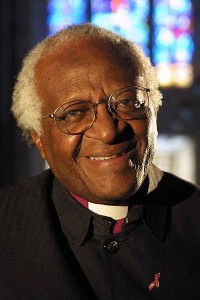Tutu on “Religious Human Rights and the Bible”
I few weeks ago I wrote a post discussing health care as a right. Since then I have had several good conversations with people from across the political spectrum on what constitutes a “human right” and what the implications are of such a delineation. Last night I came across a 1996 article by Archbishop Desmond Tutu (a hero of mine) entitled Religious Human Rights and the Bible. In just a few short pages he frames the question brilliantly by exploring how the Christian worldview calls us to understand the importance and dignity of each human being.
Tutu begins by acknowledging that religion (especially Christianity) has led to oppression and injustice. Yet, he is quick to counter by pointing out the narrative of Scripture calls for a different view of things. He bases his argument on the implications of the creation story where all humanity is uniquely created in the image of God. He says:
The Bible claims for all human beings this exalted status that we are all, each one of us, created in the divine image, that it has nothing to do with this or that extraneous attribute which by the nature of the case, can be possessed by only some people… We must therefore have a deep reverence for the sanctity of human life… The life of every human person is inviolable a gift from God.
Being created in the image of God is not just about identity Tutu contends, it is also about calling and purpose.
The [Biblical Narrative] declares that the human being created in the image of God is meant to be God’s viceroy, God’s representative in having rule over the rest of creation on behalf of God. To have dominion, not in an authoritarian and destructive manner, but to hold sway as God would hold sway–compassionately, gently, caringly, enabling each part of creation to come fully into its own and to realize its potential for the good of the whole, contributing to the harmony and unity which was God’s intention for the whole of creation.
When we understand ourselves and others in light of our connection with God, it requires a different response to questions about humanity and the rights of all persons.
[This understanding] imbues each one of us with profound dignity and worth… In the face of injustice and oppression it is to disobey God not to stand up in opposition to that injustice and that oppression Any violation of the rights of God’s stand-in cries out to be condemned and to be redressed, and all people of good will must be engaged in upholding and persevering those rights as a religious duty. Such a discussion as this one should therefore not be merely an academic exercise in the most pejorative sense. It must be able to galvanize participants with a zeal to be active protectors of the rights of persons.
Even if we capture the depth and breadth of the implications of this understanding of God and his people, we are still faced with the fact that humanity was given the freedom to choose right or wrong, good or evil, obedience or rebellion. We must not only understand who we are in light of our creator, we must also walk the delicate line of what it means to embody this reality. Tutu explains:
We are created to exist in a delicate network of interdependence with fellow human beings and the rest of God’s creation. All sorts of things go horribly wrong when we break this fundamental of our being. Then we are no longer appalled as we should be that vast sums are spent on budgets of death and destruction, when a tiny fraction of those sums would ensure that God’s children everywhere would have a clean supply of water, adequate health care, proper housing and education, enough to eat and to war.
Tutu contends that it is only when we are willing to first understand ourselves and others in light of our relationship with God and our role as bearers-of-the-image-of-God, that we are truly able to to grasp the dignity, worth and inherent rights of all persons. He concludes:
The biblical understanding of being human includes freedom from fear and insecurity, freedom from penury and want, freedom of association and movement, because we would live ideally in the kind of society that is characterized by these attributes. It would be a caring and compassionate, a sharing and gentle society in which, like God, the strongest would be concerned about the welfare of the weakest, represented in ancient society by the widow, the alien, and the orphan. It would be a society in which you reflected the holiness of God not by ritual purity and cultic correctness, but by the fact that when you gleaned your harvest, you left something behind for the poor, the unemployed, the marginalized ones–all a declaration of the unique worth of persons that does not hinge on their economic, social, or political status but simply on the fact that they are persons created in God’s image. That is what invests them with their preciousness and from this stems all kinds of rights.
Tutu’s analysis is poignant and thought provoking — especially for Christians. It is not adequate to define human rights in terms of the constitution or any body of law. Likewise, we cannot base our decisions on what is right on economic models or political ideologies. Instead, we must ask a different sort of question. We must inquire as to how we can love and care for all people — all of whom are created in the image of God.
All marks of emphasis in quotations are mine. Religious Human Rights and the Bible was originally published in Volume 10 of the Emory International Law Review. You can download the complete file here from The Center for the Study of Law and Religion at Emory University.
